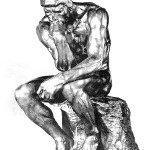
In a day an age where science is EVERYTHING, we sometimes forget that philosophy is the ‘thinking of thinking’ and needs to play an important role when we discuss how we should eat. After all, we shouldn’t confuse data collection with wisdom. The more we simply absorb data without truly critically analyzing its meaning, the more we can potentially fall victim to many of the diet and nutrition scams that are so prevalent in today’s world.We have an unbelievable amount of data, and thanks to our love affair with the ‘sound bytes’ that come from science we have all but abolished philosophy as a discipline, save for the quotes that occasionally appear on a person’s Facebook update status.But philosophy is of critical importance if we are to truly understand how and why we eat.It’s been said that philosophy calls us when we’ve reached the end of our rope. The insistent feeling that something is not right with our lives and the longing to be restored to our better selves will not go away.I’d be willing to guess that ‘end of our rope’ ‘somethings not right’ and ‘restored to our better selves’ would accurately describe how many feel about nutrition and deciding what to eat.We become philosophers to discover what is really true and what is merely the accidental result of flawed reasoning, recklessly acquired erroneous judgments, and the well-intentioned but misguided teachings of experts and gurus. In this sense, philosophy and the scientific collection of data aren’t really opposites but rather necessary components of the whole ‘picture’.No mater what nutritional beliefs you hold true, you will probably agree when I say that we simply cannot eat everything that is available to us on any given day. food is simply too abundant, too available and too cheap for us to live in a constant state of eating at raw impulse
Read this article –
My Philosophy of Intermittent Fasting | Brad Pilon's 'Eat Blog Eat'
Tagged with: concept • data • diet • facebook • intermittent • king • person • philosophy • reached-the-end • scientific • type
Filed under: Fitness

 For now classes are 6pm and 640pm at 2840 Wildwood st in the Boise Cloggers studio.
Book your class NOW!
click this ==>
For now classes are 6pm and 640pm at 2840 Wildwood st in the Boise Cloggers studio.
Book your class NOW!
click this ==>








